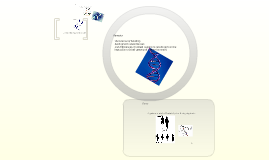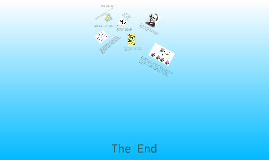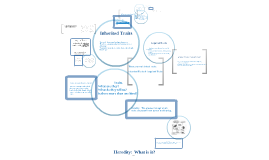Heredity PowerPoint
Transcript: Heretity PowerPoint By.Maria Ruiz How organisms are cloned How organisms are cloned Cloning Cloning Cloning is A clone is a genetically identical copy of an organism, and it may be naturally occurring or created in the lab. Through the process of asexual reproduction, organisms such as bacteria create offspring that are genetically identical to the parent. Modern genetic technology can also be used to create clones. There are three types of cloning: gene cloning, reproductive cloning, and therapeutic cloning. Gene cloning is essentially recombinant DNA technology, where a piece of foreign DNA is inserted into a vector, which can be copied by a host cell. Therapeutic cloning involves the production of patient-matched stem cells for disease treatment. Here we focus on reproductive cloning of organisms. Animal Cloning Animal Cloning Animal cloning is a little different. Cloning is a method of producing two or more genetically identical organisms by asexual reproduction. This means that there is only one parent cell, from which all the genetic information will come. Thus, the DNA sequence of cloned organisms is exactly the same as that of the parent cell. In nature, cloning occurs when identical twins, triplets, and so on are born or when a cutting from a plant is used to generate another plant. It also occurs in organisms that reproduce by asexual reproduction, such as bacteria and yeast. Recently, laboratory experiments have generated animal clones using a variety of different parent cell types. Ethical issues behind cloning Ethical issues behind cloning The key ethical issue with therapeutic cloning is the moral status of the cloned embryo, which is created solely for destruction. Issue #1 Issue #1 The ethical issues with reproductive cloning include genetic damage to the clone, health risks to the mother, very low success rate meaning loss of large numbers of embryos and fetuses, psychological harm to the clone, complex altered familial relationships, and commodification of human life. Issue #2 Issue #2 by a new technique that had never before been fully successful in mammals. The technique involved transplanting the genetic material of an adult sheep, apparently obtained from a well-differentiated somatic cell, into an egg from which the nucleus had been removed. Issue #3 Issue #3 Cloned human embryos have been produced, but there are no reliable reports that any have been implanted in a woman’s uterus, let alone developed to birth. Cloning to birth has come to be called "reproductive cloning", where as cloning embryos so that their stem cells may be extracted for possible research or therapeutic use has come to be called "therapeutic cloning". Issue #4 Issue #4 Researchers are going a step further by trying to create generalized donor cells. In mice, scientists have been able to obtain stem cells, which are undifferentiated and have the potential to develop into any kind of tissue. Scientists believe this can be done with humans as well. This would allow scientists to create cells that could replace ones damaged by an illness Issue #5 Issue #5 Do i support cloning? I do not support cloning because there are a lot of issues in cloning such as damage to the clone, health risks that the mother has to take, very low success rate meaning loss of large numbers of embryos and fetuses, psychological harm to the clone, complex altered familial relationships, and commodification of human life. Do i support cloning?

















